 W
WThe Watergate scandal was a political scandal in the United States involving the administration of U.S. President Richard Nixon from 1972 to 1974 that led to Nixon's resignation. The scandal stemmed from the Nixon administration's continuous attempts to cover up its involvement in the June 17, 1972 break-in of the Democratic National Committee headquarters at the Washington, D.C. Watergate Office Building. After the five perpetrators were arrested, the press and the U.S. Justice Department connected the cash found on them at the time to the Nixon re-election campaign committee. Further investigations, along with revelations during subsequent trials of the burglars, led the U.S. House of Representatives to grant its judiciary committee additional investigation authority to probe into "certain matters within its jurisdiction", and the U.S. Senate to create a special investigative committee. The resulting Senate Watergate hearings were broadcast "gavel-to-gavel" nationwide by PBS and aroused public interest. Witnesses testified that the president had approved plans to cover up administration involvement in the break-in, and that there was a voice-activated taping system in the Oval Office. Throughout the investigation, the administration resisted its probes, which led to a constitutional crisis.
 W
WThe Abbess of Crewe is a novella published in 1974 by Muriel Spark. It is centred on a Catholic convent in Crewe and the political intrigues surrounding the election of a new abbess, after the death of the former. It exhibits Spark's typical style of crossing seamlessly between temporal points in the narrative. Michael Lindsay-Hogg adapted the novel into his film Nasty Habits, released in 1977. This book is considered an allegorical treatment of the Watergate scandal.
 W
WThe Committee for the Re-election of the President, abbreviated CRP, but often mocked by the acronym CREEP, was, officially, a fundraising organization of United States President Richard Nixon's 1972 re-election campaign.
 W
WThe Watergate complex is a group of six buildings in the Foggy Bottom neighborhood of Washington, D.C., in the United States. Covering a total of 10 acres adjacent to the John F. Kennedy Center for the Performing Arts, the buildings include:Watergate West, cooperative apartments. Watergate 600, office building. Watergate Hotel. Watergate East, cooperative apartments. Watergate South, cooperative apartments. Watergate Office Building, the office building where the Watergate burglary happened.
 W
WDeep Throat is the pseudonym given to the secret informant who provided information in 1972 to Bob Woodward, who shared it with Carl Bernstein. Woodward and Bernstein were reporters for The Washington Post, and Deep Throat provided key details about the involvement of U.S. president Richard Nixon's administration in what came to be known as the Watergate scandal. In 2005, 31 years after Nixon's resignation and 11 years after Nixon's death, a family attorney stated that former Federal Bureau of Investigation (FBI) Associate Director Mark Felt was Deep Throat. By then, Felt was suffering from dementia and had previously denied being Deep Throat, but Woodward and Bernstein then confirmed the attorney's claim.
 W
WDaniel Ellsberg is an American economist, political activist, and former United States military analyst who, while employed by the RAND Corporation, precipitated a national political controversy in 1971 when he released the Pentagon Papers, a top-secret Pentagon study of the U.S. government decision-making in relation to the Vietnam War, to The New York Times, the Washington Post and other newspapers.
 W
WBruce Givner is an American attorney best known for his role on the evening of the Watergate burglary. While working as an intern, Givner remained in the Democratic National Committee's Watergate offices until just after midnight, making free long-distance phone calls to friends and family. His presence substantially delayed the break-in and indirectly led to the eventual arrests of the burglars.
 W
WHoward Robard Hughes Jr. was an American business magnate, investor, record-setting pilot, engineer, film director, and philanthropist, known during his lifetime as one of the most financially successful individuals in the world. He first became prominent as a film producer, and then as an influential figure in the aviation industry. Later in life, he became known for his eccentric behavior and reclusive lifestyle—oddities that were caused in part by his worsening obsessive-compulsive disorder (OCD), chronic pain from a near-fatal plane crash, and increasing deafness.
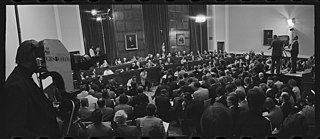 W
WThe impeachment process against Richard Nixon began in the United States House of Representatives on October 30, 1973, following the series of high-level resignations and firings widely called the "Saturday Night Massacre" during the course of the Watergate scandal. The House Committee on the Judiciary set up an impeachment inquiry staff and began investigations into possible impeachable offenses by Richard Nixon, the 37th president of the United States. The process was formally initiated on February 6, 1974, when the House granted the Judiciary Committee authority to investigate whether sufficient grounds existed to impeach Nixon of high crimes and misdemeanors under Article II, Section 4, of the United States Constitution. This investigation was undertaken one year after the United States Senate established the Select Committee on Presidential Campaign Activities to investigate the 1972 break-in at the Democratic National Committee headquarters at the Watergate office complex in Washington, D.C., and the Republican Nixon administration's attempted cover-up of its involvement; during those hearings the scope of the scandal became apparent and the existence of the Nixon White House tapes was revealed.
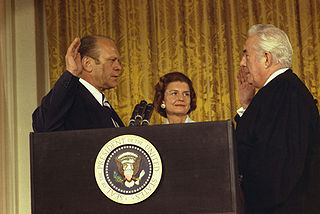 W
WThe inauguration of Gerald Ford as the 38th President of the United States was held on Friday, August 9, 1974, in the East Room of the White House in Washington, D.C., after Richard Nixon, the 37th President, resigned due to the Watergate scandal. The inauguration – the last non-scheduled, extraordinary inauguration to take place in the 20th century – marked the commencement of Gerald Ford's only term as President. Chief Justice Warren E. Burger administered the oath of office. The Bible upon which Ford recited the oath was held by his wife, Betty Ford, open to Proverbs 3:5–6. Ford was the ninth Vice President of the United States to succeed to the presidency intra-term, and he remains the most recent to do so.
 W
WA master list of Nixon political opponents was compiled to supplement the original Nixon's Enemies List of 20 key people considered opponents of President Richard Nixon. The master list was compiled by Charles Colson's office and sent in memorandum form to John Dean. Dean later provided to the Senate Watergate Committee this updated "master list" of political opponents. The original list split out "Black Congressmen", listing "all of the Black congressmen [and congresswomen]".
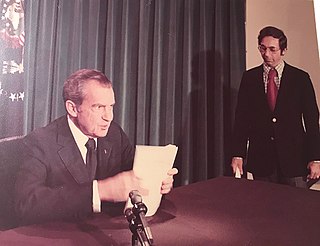 W
WPresident Richard Nixon made an address to the American public from the Oval Office on August 8, 1974, to announce his resignation from the presidency due to the Watergate scandal.
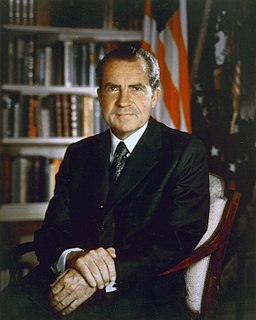 W
W"Nixon's Enemies List" is the informal name of what started as a list of President of the United States Richard Nixon's major political opponents compiled by Charles Colson, written by George T. Bell, and sent in memorandum form to John Dean on September 9, 1971. The list was part of a campaign officially known as "Opponents List" and "Political Enemies Project".
 W
WIn the context of the Watergate scandal, Operation Gemstone was a proposed series of clandestine or illegal acts, first outlined by G. Gordon Liddy in two separate meetings with three other individuals: then-Attorney General of the United States, John N. Mitchell, then-White House Counsel John Dean, and Jeb Magruder, an ally and former aide to H.R. Haldeman, as well as the temporary head of the Committee to Re-elect the President, pending Mitchell's resignation as Attorney General.
 W
WOperation Sandwedge was a proposed clandestine intelligence-gathering operation against the political enemies of the Richard Nixon presidential administration. The proposals were put together by H. R. Haldeman, John Ehrlichman and Jack Caulfield in 1971. Caulfield, a former police officer, created a plan to target the Democratic Party and the anti-Vietnam War movement, inspired by what he believed to be the Democratic Party's employment of a private investigation firm.
 W
WThe pardon of Richard Nixon was a presidential proclamation issued by President of the United States Gerald Ford on September 8, 1974. By it, Ford granted to Richard Nixon, his predecessor, a full and unconditional pardon for any crimes that he might have committed against the United States as president. In particular, the pardon covered Nixon's actions during the Watergate scandal. In a televised broadcast to the nation, Ford, who had succeeded to the presidency upon Nixon's resignation, explained that he felt the pardon was in the best interests of the country and that the Nixon family's situation was "a tragedy in which we all have played a part. It could go on and on and on, or someone must write the end to it. I have concluded that only I can do that, and if I can, I must."
 W
WElliot Lee Richardson was an American lawyer and public servant who was a member of the cabinet of Presidents Richard Nixon and Gerald Ford. As U.S. Attorney General, he was a prominent figure in the Watergate Scandal, and resigned rather than obey President Nixon's order to fire special prosecutor Archibald Cox.
 W
WSaturday Night Massacre refers to a series of events that took place in the United States on the evening of Saturday, October 20, 1973, during the Watergate scandal. U.S. President Richard Nixon ordered Attorney General Elliot Richardson to fire Special Prosecutor Archibald Cox; Richardson refused and resigned effective immediately. Nixon then ordered Deputy Attorney General William Ruckelshaus to fire Cox; Ruckelshaus refused, and also resigned. Nixon then ordered the third-most-senior official at the Justice Department, Solicitor General Robert Bork, to fire Cox. Bork carried out the dismissal as Nixon asked. Bork claimed that he intended to resign afterward, but was persuaded by Richardson and Ruckelshaus to stay on for the good of the Justice Department.
 W
WThe Watergate Seven has come to refer to two different groups of people, both of them in the context of the Watergate scandal. Firstly, it can refer to the five men caught on June 17, 1972, burglarizing the Democratic National Committee's headquarters in the Watergate complex, along with their two handlers, E. Howard Hunt and G. Gordon Liddy, who were Nixon campaign aides. All seven were tried before Judge John Sirica in January 1973.
 W
WBarbara Charline Jordan was an American lawyer, educator and politician who was a leader of the Civil Rights Movement. A Democrat, she was the first African American elected to the Texas Senate after Reconstruction and the first Southern African-American woman elected to the United States House of Representatives. She was best known for her eloquent opening statement at the House Judiciary Committee hearings during the impeachment process against Richard Nixon, and as the first African-American as well as the first woman to deliver a keynote address at the 1976 Democratic National Convention. She received the Presidential Medal of Freedom, among numerous other honors. She was a member of the Peabody Awards Board of Jurors from 1978 to 1980. She was the first African-American woman to be buried in the Texas State Cemetery. Jordan's work as chair of the U.S. Commission on Immigration Reform, which recommended reducing legal immigration by about one-third, is frequently cited by American immigration restrictionists.
 W
WRoger Jason Stone is an American conservative political consultant, lobbyist, and convicted felon. In November 2019, subsequent to the Mueller report and Special Counsel investigation, he was convicted on seven counts, including witness tampering and lying to investigators. On February 20, 2020, he was sentenced to 40 months in federal prison. The sentence was commuted by President Donald Trump on July 10, 2020.
 W
WThe Watergate scandal refers to the burglary and illegal wiretapping of the Washington, D.C. headquarters of the Democratic National Committee, in the Watergate complex, by members of President of the United States Richard Nixon's re-election committee and subsequent abuse of powers by the president and administration officials to halt or hinder the investigation into same.
 W
WThe Senate Watergate Committee, known officially as the Select Committee on Presidential Campaign Activities, was a special committee established by the United States Senate, S.Res. 60, in 1973, to investigate the Watergate scandal, with the power to investigate the break-in at the Democratic National Committee (DNC) headquarters at the Watergate office complex in Washington, D.C., and any subsequent cover-up of criminal activity, as well as "all other illegal, improper, or unethical conduct occurring during the controversial 1972 presidential election, including political espionage and campaign finance practices".
 W
WUnited States v. Nixon, 418 U.S. 683 (1974), was a landmark United States Supreme Court case that resulted in a unanimous decision against President Richard Nixon, ordering him to deliver tape recordings and other subpoenaed materials to a federal district court. Issued on July 24, 1974, the decision was important to the late stages of the Watergate scandal, when there was an ongoing impeachment process against Richard Nixon. United States v. Nixon is considered a crucial precedent limiting the power of any U.S. president to claim executive privilege.
 W
WWatergate Babies are Democrats first elected to the United States Congress in the 1974 elections, following President Richard Nixon's resignation over the Watergate scandal, on August 9, 1974.
 W
WThe revelation of the existence and scope of crimes and abuses committed by Nixon's staff during his presidency, known collectively as the "White House Horrors", was among the many events of the Watergate scandal. More than 70 people were convicted of crimes related to Watergate; some pleaded guilty before trial.
 W
WThe White House Plumbers, sometimes simply called the Plumbers, the "Room 16 Project," or more officially, the White House "Special Investigations Unit" was a covert White House Special Investigations Unit, established within a week after the publication of the "Pentagon Papers" in June 1971, during the presidency of Richard Nixon. Its task was to stop and/or respond to the leaking of classified information, such as the Pentagon Papers, to the news media. The work of the unit "tapered-off" after the bungled "Ellsberg break-in" but some of its former operatives branched into illegal activities while still employed at the White House together with managers of the Committee to Re-elect the President, including the Watergate break-in and the ensuing Watergate scandal. The group has been described as Nixon's "fixers".
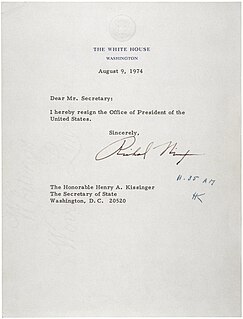 W
W W
W